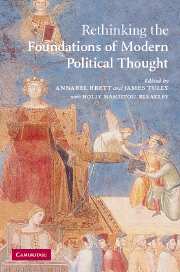Book contents
- Frontmatter
- Contents
- List of contributors
- Preface
- Part I Introduction
- Part II Rethinking the foundations
- 3 Foundations and moments
- 4 Skinner, pre-humanist rhetorical culture and Machiavelli
- 5 Unoriginal authors: how to do things with texts in the Renaissance
- 6 ‘The Best State of the Commonwealth’: Thomas More and Quentin Skinner
- 7 Scholasticism in Quentin Skinner's Foundations
- 8 Scholastic political thought and the modern concept of the state
- 9 ‘So meerly humane’: theories of resistance in early-modern Europe
- 10 Hobbes and democracy
- 11 A lion in the house: Hobbes and democracy
- 12 Hobbes and the foundations of modern international thought
- 13 Surveying The Foundations: a retrospect and reassessment
- Bibliography
- Index
9 - ‘So meerly humane’: theories of resistance in early-modern Europe
Published online by Cambridge University Press: 19 February 2010
- Frontmatter
- Contents
- List of contributors
- Preface
- Part I Introduction
- Part II Rethinking the foundations
- 3 Foundations and moments
- 4 Skinner, pre-humanist rhetorical culture and Machiavelli
- 5 Unoriginal authors: how to do things with texts in the Renaissance
- 6 ‘The Best State of the Commonwealth’: Thomas More and Quentin Skinner
- 7 Scholasticism in Quentin Skinner's Foundations
- 8 Scholastic political thought and the modern concept of the state
- 9 ‘So meerly humane’: theories of resistance in early-modern Europe
- 10 Hobbes and democracy
- 11 A lion in the house: Hobbes and democracy
- 12 Hobbes and the foundations of modern international thought
- 13 Surveying The Foundations: a retrospect and reassessment
- Bibliography
- Index
Summary
It is time, my lords, to conclude, for I have talked for much longer than I believed I would. And now you clearly see, that the Sovereign Magistrate, whichever title he has been given, has not been sent from Heaven, but is established by the common consent of the Citizens; that, if he wants to act in a way that is worthy of a Prince or Magistrate, he should recognise himself to stand under all Laws; that he cannot wield his Power at will, but as required by the Public Good; and that if he does otherwise, he does not act as a Prince or Magistrate, but as a Tyrant; and that he then may be bridled by his Subjects, in virtue of all Divine and Human Law.
With this powerful summary Gerard Noodt concluded his farewell lecture as Rector of the University of Leiden. It was February 1699 and Noodt had chosen ‘The Power of Sovereigns’ as the title of a lecture that was a synthesis of seventeenth-century debates on natural liberty, the formation of the commonwealth, the nature of sovereignty and the legitimacy of resistance against tyranny. Noodt presented his conclusions as mere common sense, underpinned by references to the leading authorities on the subject, to George Buchanan, the Vindiciae contra Tyrannos, Hugo Grotius and Samuel Pufendorf.
One of the most important legacies of Quentin Skinner's Foundations is its systematic study of theories of resistance in early-modern Europe – from Luther to Locke.
- Type
- Chapter
- Information
- Rethinking The Foundations of Modern Political Thought , pp. 149 - 170Publisher: Cambridge University PressPrint publication year: 2006
- 3
- Cited by

